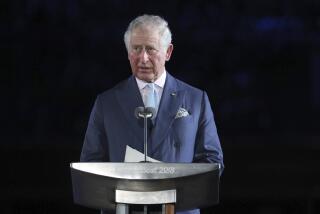Future of Church-State Ties May Rest on Prince Charles
- Share via
LONDON — From all the pomp, circumstance and tabloid furor that attends him, it’s clear that the Prince of Wales is no ordinary fellow.
But after the recent broadcast of a controversial documentary of his life, it became clear that Prince Charles is no ordinary Anglican either.
If and when Charles succeeds his mother to become Great Britain’s ruling monarch and head of the Church of England, there is a growing sense in Britain that the relationship between the church and the crown may never be the same.
“I am one of those people who searches,” Charles told Jonathan Dimbleby, the well-known British journalist who hosted “Charles: The Private Man, the Public Role,” broadcast nationwide June 28 on Independent Television.
“All the great prophets, all the great thinkers, those who achieved a far greater awareness of the aspects of life which lie beneath the surface, all share the same understanding of the universe, of the nature of God, of the purpose of our existence,” he said. “And that’s why I feel it’s so important to understand the common threads which link us all in one great important tapestry.”
Charles is heir not only to the British crown, but to the title “defender of the faith,” bestowed by Pope Leo X on King Henry VIII in 1521 for his defense of Catholic Orthodoxy from the attacks of Martin Luther. He will also assume the role of supreme governor of the Church of England, which began with Henry VIII’s assumption of power over the church after his break with Rome in 1534.
But the prince’s evident interest in all religions and his statements that the king should represent not only Protestants but all believers has once again raised the question of “disestablishmentarianism”--whether the Anglican faith should no longer be Great Britain’s official religion.
The future king acknowledged in the interview that he preferred to be regarded as the defender of all faiths rather than the defender of one.
“I would much rather it was seen as defending faith itself, which is so often under so much threat in our day, where the whole concept of faith or belief in anything beyond this existence, beyond life itself, is considered almost old-fashioned and irrelevant,” he said.
“I have always felt the Catholic subjects of the sovereign are equally as important as the Anglican ones or the Protestant ones,” Charles continued. “Likewise, I think that the Islamic subjects or the Hindu subjects or the Zoroastrian subjects of the sovereign are of equal and vital importance.”
In a recent interview with The Times of London, Archbishop John Habgood of York said any move to separate church and state would be “difficult and dangerous” and could jeopardize both the monarchy and the union between England and Scotland.
The issue of the Church of England’s disestablishment will come up at the Church of England’s general synod, which began in York Friday. Bishop Colin Buchanan has called for the lifting of direct state control over the appointment of bishops and over legislation approved by the synod.
Currently, the British prime minister has the final say in the appointment of bishops; Parliament has the power to veto any measures approved by a church synod. Bishops are nominated by a panel of church and government leaders and approved by the crown.
But the long-simmering issue is not likely to be settled soon. The synod is expected to push for an amendment that will merely ask the archbishops of Canterbury and York to set up a commission--the fifth this century--to review the constitutional relationship between the Church of England and the state.
More to Read
Sign up for Essential California
The most important California stories and recommendations in your inbox every morning.
You may occasionally receive promotional content from the Los Angeles Times.













